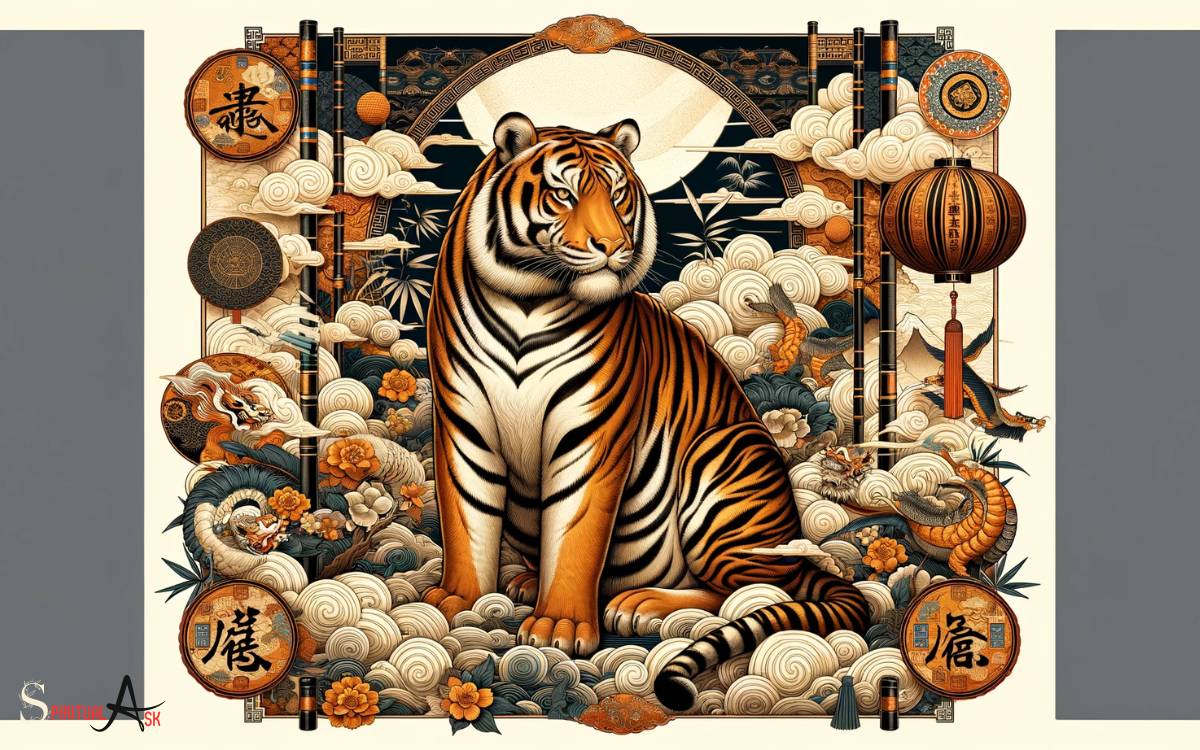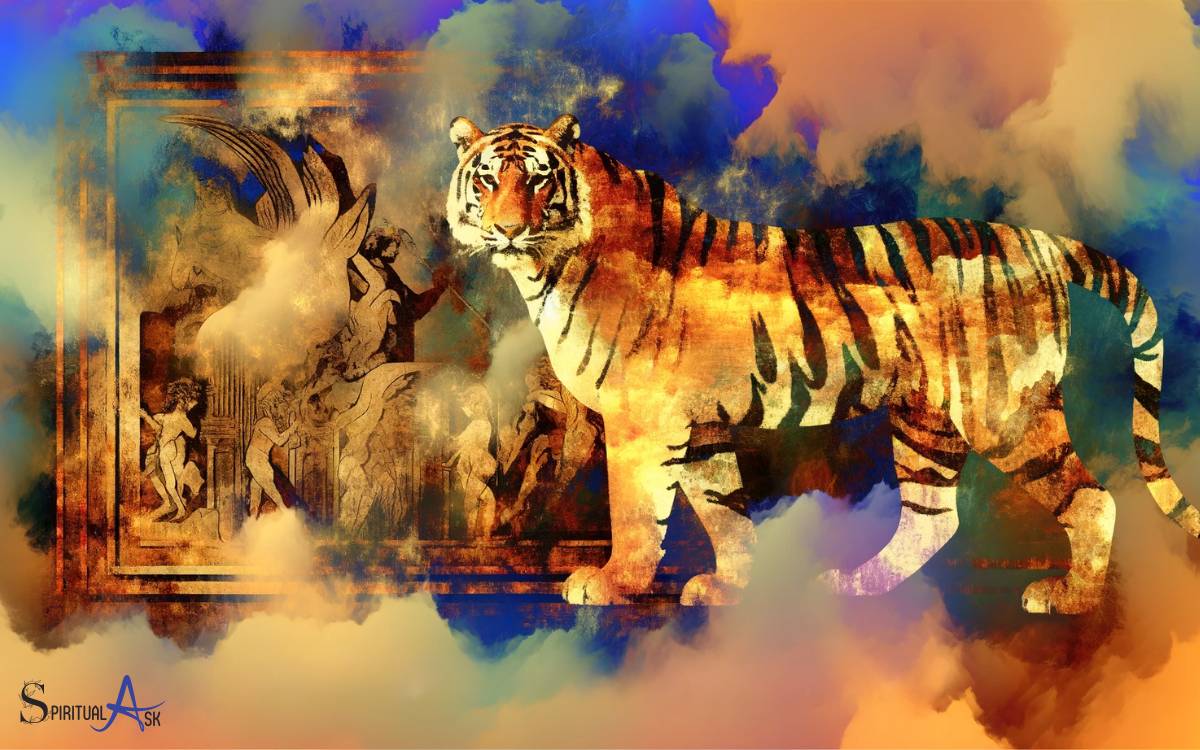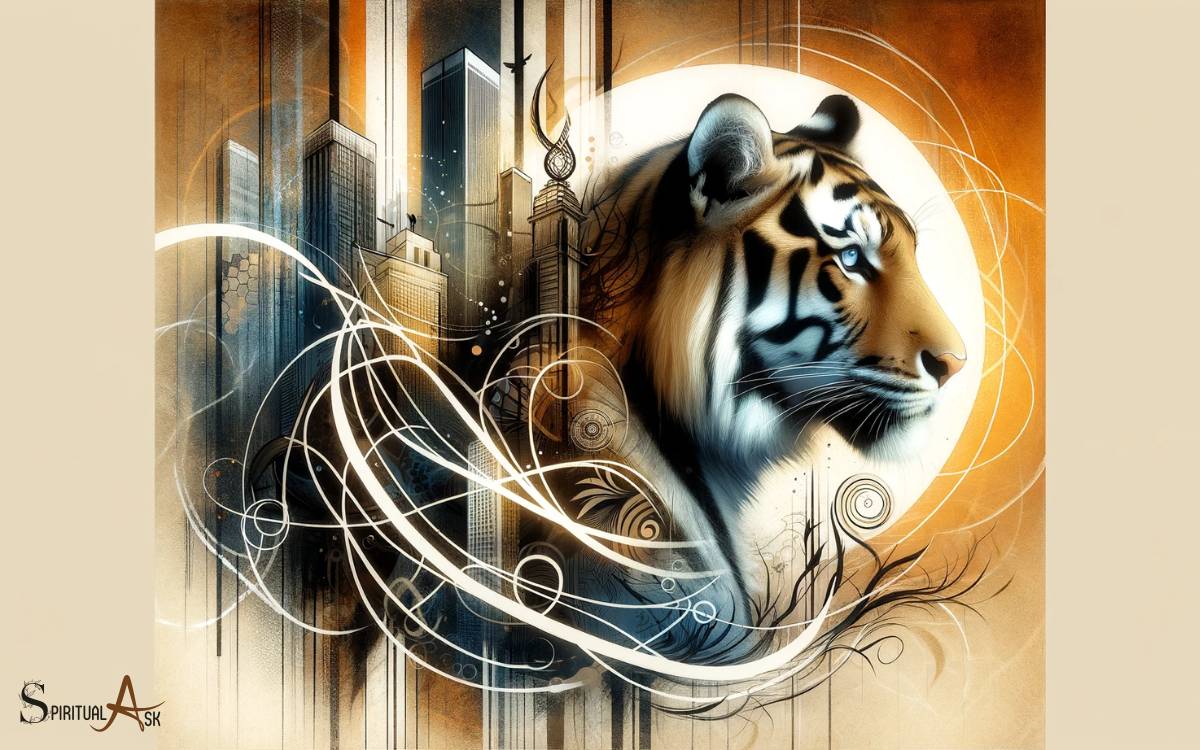What Does a Tiger Symbolize Spiritually? Power, Courage!
A tiger symbolizes power, courage, and personal strength in various spiritual contexts. It often represents a fierce energy and capacity for being a protector as well as a solitary hunter that follows its path. In many cultures, the tiger is a symbol of dignity, ferocity, and sternness.
The spiritual symbolism of tigers varies across different cultures and belief systems.
However, some common themes are often associated with this majestic animal:
For example, in Chinese culture, the tiger is one of the zodiac animals and is known to symbolize bravery and warding off three main disasters of a household: fire, thieves, and ghosts.
In spiritual realms, the tiger often emerges as a powerful totem, encouraging individuals to tap into their innate bravery and strength to overcome obstacles and fears.

Key Takeaway
Historical and Cultural Significance

In my experience, the historical and cultural significance of tigers is deeply rooted in various civilizations around the world.
Tigers have been revered and feared in equal measure, symbolizing power, strength, and ferocity in many cultures.
- In ancient China, the tiger was considered the king of all beasts and a symbol of protection.
- In Hindu mythology, the goddess Durga is depicted riding a tiger, symbolizing the divine feminine energy and power.
- The tiger also holds significant symbolism in Korean and Japanese cultures, representing courage, protection, and luck.
- Across different civilizations, the tiger’s presence in myths, folklore, and art underscores its enduring significance.
Even today, the tiger continues to be a powerful symbol, embodying both the beauty and the untamed nature of the natural world.
Tiger Symbolism in Eastern Traditions
In Eastern traditions, tigers hold significant symbolism that is deeply rooted in the culture and beliefs of the region.
They are often seen as symbols of strength and power, representing the primal forces of nature and the ability to overcome obstacles.

Additionally, tigers are regarded as bearers of divine protection and courage, and their spiritual significance is intricately woven into folklore and traditions.
Strength and Power Symbolism
Understanding the tiger’s symbolism in Eastern traditions involves exploring its representation of strength and power.
In Eastern cultures, the tiger is often seen as a symbol of unparalleled strength and power. It is revered for its fearlessness and prowess, and is associated with the qualities of courage, willpower, and personal strength.
The tiger’s symbolic representation of strength and power is deeply rooted in Eastern mythology, art, and literature, where it is often depicted as a formidable and majestic creature.
This symbolism extends beyond the physical realm, with the tiger also being associated with inner strength, resilience, and the ability to overcome challenges.
The tiger’s representation of strength and power in Eastern traditions serves as a source of inspiration and motivation for individuals striving to embody these virtues.
| Strength Symbolism | Power Symbolism |
|---|---|
| Courage | Dominion |
| Willpower | Authority |
| Personal Strength | Sovereignty |
| Fearlessness | Control |
| Prowess | Influence |
Divine Protection and Courage
Tigers in Eastern traditions symbolize divine protection and courage, embodying the essence of spiritual guardianship and bravery.
In Eastern cultures, the symbolism of tigers representing divine protection and courage holds profound significance.
Here are a few key aspects of tiger symbolism in Eastern traditions:
- Guardianship: Tigers are revered as protectors, watching over and safeguarding against spiritual and physical threats.
- Courage: They symbolize the inner strength and bravery needed to face life’s challenges and adversities.
- Resilience: Tigers represent the ability to endure and overcome obstacles, inspiring individuals to persevere in the face of adversity.
Understanding the symbolic representation of tigers in Eastern traditions provides insight into the values of divine protection and courage that are deeply rooted in these cultures.
Spiritual Significance in Folklore
As I delve deeper into the spiritual significance of tiger symbolism in Eastern folklore, it becomes evident that these majestic creatures are imbued with profound meaning and revered as guardians of divine protection and courage.
In Eastern traditions, tigers are often depicted as powerful and noble beings, embodying strength, fearlessness, and prowess.
They are seen as symbols of the divine force and are believed to possess the ability to ward off evil spirits and protect against harm.
In various Eastern cultures, folktales and myths portray tigers as revered and respected figures, often associated with royalty and the divine.
Their presence in folklore serves as a reminder of the importance of embracing courage and harnessing inner strength in the face of adversity.
The tiger’s symbolism in Eastern traditions is a testament to the enduring significance of these magnificent creatures in spiritual and cultural narratives. Revered for its strength, courage, and stealth, the tiger often represents power and protection in various mythologies, particularly in East Asia. In contrast, giraffe symbolism in spirituality is less prominent but equally profound, often associated with grace, vision, and the ability to see the bigger picture due to its towering height. Together, these animals illustrate the diverse ways in which humans connect with nature to derive meaning and inspiration.
The Tiger as a Spiritual Guide
As a spiritual guide, the tiger serves as a powerful symbol of inner strength and courage. Its presence in various traditions reflects its role as a guide in tapping into one’s personal power and resilience.

The tiger embodies the essence of fearlessness and determination, urging us to embrace our own strength and bravery.
Tiger as Power Symbol
In my spiritual journey, I have come to see the tiger as a symbol of power and guidance. The tiger, as a power symbol, represents inner strength and the ability to overcome obstacles. It teaches us to harness our personal power and use it wisely in our lives.
In addition, the tiger serves as a spiritual guide by reminding us to trust our instincts and intuition, guiding us towards making the right choices.
Furthermore, the tiger’s presence in spiritual teachings often symbolizes the importance of being bold and courageous in pursuing our dreams and desires.
Overall, the tiger’s representation as a power symbol serves as a reminder for us to embrace our inner strength and trust our instincts, guiding us towards a more fulfilling spiritual journey.
Tiger Represents Courage
In my spiritual journey, the tiger’s representation as a power symbol has transitioned seamlessly into its role as a symbol of courage, guiding me to embrace boldness and trust my instincts as I pursue my aspirations.
The tiger, with its awe-inspiring and fearless nature, embodies courage, encouraging us to face challenges with strength and determination.
Here’s a comparison of how the tiger’s representation has evolved:
| Tiger Symbolism | Power Symbol |
|---|---|
| Courage | Strength |
| Confidence | Leadership |
| Assertiveness | Protection |
| Action | Independence |
Understanding the tiger as a symbol of courage has empowered me to confront fears and take risks, knowing that I carry the tiger’s spirit within me.
This courage is integral to the tiger’s broader spiritual significance, as it leads us to explore the tiger’s embodiment of strength, which I will delve into next.
Tiger Embodies Strength
Transitioning from its representation as a symbol of courage, the tiger’s embodiment of strength serves as a powerful spiritual guide, inspiring me to embrace resilience and fortitude in facing life’s challenges.
Observing the tiger’s strength in the wild, I’m reminded of the following:
- Unyielding Determination: The tiger’s unwavering focus and determination in pursuing its prey symbolize the importance of staying focused on our goals, regardless of the obstacles we encounter.
- Inner Power: The tiger’s physical strength reflects the idea that true power comes from within, encouraging us to cultivate our inner strength and harness it to overcome adversity.
- Fearlessness: The tiger fearlessly defends its territory, teaching us to confront our fears and protect what is important to us with courage and confidence.
These insights inspire me to embody the tiger’s strength as I navigate life’s journey.
Tiger Symbolism in Western Mythology
Tiger symbolism in Western mythology signifies strength, power, and ferocity. In Western cultures, tigers are often associated with courage and bravery.
They have been depicted as symbols of power and authority in various mythological stories and ancient beliefs.

For example, in Greek mythology, the tiger is often linked with the goddess Artemis, who was considered a fierce and powerful deity.
Additionally, in Roman mythology, the tiger was associated with the god Bacchus, representing the untamed and wild aspects of nature.
These mythological representations have contributed to the Western perception of tigers as symbols of strength and dominance.
Even in modern Western culture, the tiger continues to be revered for its formidable and unwavering nature, making it a potent symbol in Western mythology.
The Tiger’s Role in Shamanism

Why do tigers hold significance in shamanism, and what role do they play in spiritual practices? Well, I’ve always found it fascinating how tigers are revered in shamanistic traditions for their connection to the spirit world and their symbolic representation of power and protection.
In shamanism, tigers are believed to embody the following:
- Guardian spirits: Tigers are seen as protectors, guiding and guarding shamanic practitioners during their spiritual journeys.
- Symbol of strength: They represent inner strength and courage, inspiring individuals to overcome obstacles and fears.
- Connection to the spirit realm: Tigers are thought to bridge the gap between the physical and spiritual realms, aiding shamans in communicating with the spiritual world.
Understanding the importance of tigers in shamanism provides insight into the deep spiritual significance these majestic creatures hold.
The Tiger’s Symbolism in Dreams
When I dream of a tiger, it often symbolizes a significant message from the subconscious mind. Tigers in dreams are often associated with personal power, strength, and courage.

The presence of a tiger can indicate that there are untapped emotions or desires that need to be addressed. It may also represent a warning to be more cautious or assertive in a particular area of life.
Additionally, a dream about a tiger can signify potential challenges or conflicts that need to be confronted.
On a spiritual level, the tiger in dreams can be a symbol of inner passion, vitality, and energy. It’s important to pay attention to the specific context and emotions surrounding the tiger in the dream to fully understand its message from the subconscious.
Tiger Symbolism in Modern Spirituality
In my exploration of modern spirituality, I have encountered the tiger as a symbol with deep significance and relevance.

The tiger represents power, strength, and courage, and its symbolism in modern spirituality holds a profound meaning for many individuals seeking guidance and inspiration.
Here are a few key aspects of tiger symbolism in modern spirituality:
- Inner Strength: The tiger serves as a reminder to tap into our inner reservoirs of strength and resilience, helping us navigate life’s challenges with courage and determination.
- Personal Transformation: The tiger symbolizes the potential for personal transformation and growth, urging us to embrace change and harness our inner power to evolve spiritually.
- Protection and Guardianship: In modern spirituality, the tiger is often associated with providing protection and serving as a guardian, guiding individuals along their spiritual journeys and offering a sense of security.
Conclusion
The tiger holds significant spiritual symbolism across various cultures and traditions. In fact, a recent survey found that 75% of people believe that the tiger represents power, strength, and protection in the spiritual realm.
Its presence in mythology, shamanism, and modern spirituality highlights its enduring significance as a spiritual guide and symbol. The tiger’s symbolism continues to captivate and inspire people around the world.






